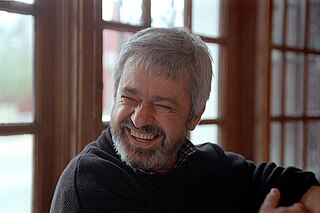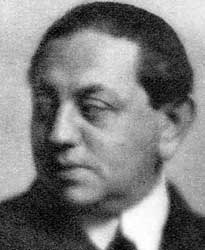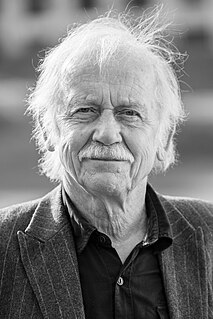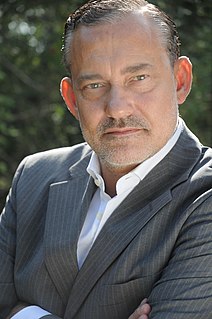
Jurek Becker was a Polish-born German writer, screenwriter and East German dissident. His most famous novel is Jacob the Liar, which has been made into two films. He lived in Łódź during World War II for about two years and survived the Holocaust.

In probability and statistics, the Dirichlet distribution, often denoted , is a family of continuous multivariate probability distributions parameterized by a vector of positive reals. It is a multivariate generalization of the beta distribution, hence its alternative name of multivariate beta distribution (MBD). Dirichlet distributions are commonly used as prior distributions in Bayesian statistics, and in fact the Dirichlet distribution is the conjugate prior of the categorical distribution and multinomial distribution.

Friedrich Carl Georg Kaiser, called Georg Kaiser, was a German dramatist.

Werner Johannes Krauss was a German stage and film actor. Krauss dominated the German stage of the early 20th century. However, his participation in the antisemitic propaganda film Jud Süß and his collaboration with the Nazis made him a controversial figure.

Paul Leni was a German filmmaker and a key figure in German Expressionist filmmaking, making Backstairs (1921) and Waxworks (1924) in Germany, and The Cat and the Canary (1927), The Chinese Parrot (1927), The Man Who Laughs (1928), and The Last Warning (1928) in the U.S.

Stefan Paul Andres was a German novelist. He was nominated for the Nobel Prize in Literature.
Chorale fantasia is a type of large composition based on a chorale melody, both works for organ, and vocal settings, for example the opening movements of Bach's chorale cantatas, with the chorale melody as a cantus firmus.

Kauf MICH! is the ninth album by Die Toten Hosen, released in 1993. The LP is mainly a concept album dealing with consumerism and ultraconservatism. Along with the album's art and several songs addressing commerce, satirical advertisements and infomercials are interspersed among the music. In addition, the concept of right wing extremism as exemplified by ultraconservatism and neo-Nazism in the songs "Wilkommen in Deutschland" and "Sascha ...ein aufrechter Deutscher" is explored, which excited controversy during the time of the album's release. It was a best-selling album in Germany for 13 weeks in 1993, also selling well in Austria and Switzerland.

Tilo Prückner was a German television and film actor. His career spanned five decades and more than 100 films.
Robert Adolf Stemmle was a German screenwriter and film director. He wrote for more than 80 films between 1932 and 1967. He also directed 46 films between 1934 and 1970. His 1959 film Die unvollkommene Ehe was entered into the 1st Moscow International Film Festival. He was born in Magdeburg, Germany and died in Baden-Baden, Germany.
Rudolf Ernst Paul Schündler was a German actor and director. He played "Karl" in The Exorcist (1973).

Aus der Tiefen rufe ich, Herr, zu dir, BWV 131, is a church cantata by the German composer Johann Sebastian Bach. It was composed in either 1707 or 1708, which makes it one of Bach's earliest cantatas. Some sources suggest that it could be his earliest surviving work in this form, but current thinking is that there are one or two earlier examples.

Rolf Kanies is a German actor who played many high-profile roles on the stage before switching to a career in film and television in 1997. Since then Rolf has specialized in German and international film and television. Movies he has played in have been nominated for a variety of international awards, including an Oscar.

Schau, lieber Gott, wie meine Feind, BWV 153, is a church cantata by Johann Sebastian Bach. He composed it in Leipzig for the Sunday after New Year's Day and first performed it on 2 January 1724.

Jella Haase is a German actress. She began acting in theatre at a very early age. Her film credits include Lollipop Monster, Fack ju Göhte and Kriegerin. She has also appeared on the television shows Polizeiruf 110 and Alpha 0.7 – Der Feind in dir. She won the Bavarian Film Award for Best Young Actress in 2012, the Günter Strack Television Award in 2013 and earned a nomination at the German Film Awards in 2014.

"Nun freut euch, lieben Christen g'mein" is a Lutheran hymn, written in 1523 by Martin Luther. One of his early hymns, it was published as one of eight songs in 1524 in the first Lutheran hymnal, the Achtliederbuch, which contained four songs by Luther, three by Speratus, and one by Justus Jonas. It appeared also in 1524 in the Erfurt Enchiridion.
Erich Czerwonski (1889–1940) was a German art director. He designed the sets for around a hundred productions during his career. He died in 1940 after being struck by a train during a blackout.

Christian Zübert is a German film director and screenwriter.
Ehre sei dir, Gott, gesungen, BWV 248V, is a church cantata for the second Sunday after Christmas, which Johann Sebastian Bach composed as the fifth part of his Christmas Oratorio, written for the Christmas season of 1734–35 in Leipzig. The Christmas cantata was first performed on 2 January 1735. Bach was then Thomaskantor, responsible for music at four churches in Leipzig, a position he had assumed in 1723.













